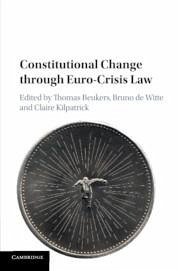Constitutional Change through Euro-Crisis Law
Herausgeber: Beukers, Thomas; Kilpatrick, Claire; Witte, Bruno De
Constitutional Change through Euro-Crisis Law
Herausgeber: Beukers, Thomas; Kilpatrick, Claire; Witte, Bruno De
- Broschiertes Buch
- Merkliste
- Auf die Merkliste
- Bewerten Bewerten
- Teilen
- Produkt teilen
- Produkterinnerung
- Produkterinnerung
A multilevel and comparative constitutional analysis of the impact of Euro-crisis law on the EU Constitution and its Member States.
Andere Kunden interessierten sich auch für
![The Political Economy of Competition Law in China The Political Economy of Competition Law in China]() Wendy NgThe Political Economy of Competition Law in China52,99 €
Wendy NgThe Political Economy of Competition Law in China52,99 €![Judicial Dissent in European Constitutional Courts Judicial Dissent in European Constitutional Courts]() Katalin KelemenJudicial Dissent in European Constitutional Courts61,99 €
Katalin KelemenJudicial Dissent in European Constitutional Courts61,99 €![Misuse of Market Power Misuse of Market Power]() Katharine KempMisuse of Market Power47,99 €
Katharine KempMisuse of Market Power47,99 €![Consumer Protection and Online Auction Platforms Consumer Protection and Online Auction Platforms]() Christine RiefaConsumer Protection and Online Auction Platforms76,99 €
Christine RiefaConsumer Protection and Online Auction Platforms76,99 €![Fighting Financial Crime in the Global Economic Crisis Fighting Financial Crime in the Global Economic Crisis]() Fighting Financial Crime in the Global Economic Crisis80,99 €
Fighting Financial Crime in the Global Economic Crisis80,99 €![The UK Competition ACT The UK Competition ACT]() Barry Rodger / Angus Macculloch (eds.)The UK Competition ACT155,99 €
Barry Rodger / Angus Macculloch (eds.)The UK Competition ACT155,99 €![Brexit: A Political Crisis for Europe: Impact Assessment and Lessons Learnt for the European Union Brexit: A Political Crisis for Europe: Impact Assessment and Lessons Learnt for the European Union]() Thomas LevermannBrexit: A Political Crisis for Europe: Impact Assessment and Lessons Learnt for the European Union27,99 €
Thomas LevermannBrexit: A Political Crisis for Europe: Impact Assessment and Lessons Learnt for the European Union27,99 €-
-
A multilevel and comparative constitutional analysis of the impact of Euro-crisis law on the EU Constitution and its Member States.
Hinweis: Dieser Artikel kann nur an eine deutsche Lieferadresse ausgeliefert werden.
Hinweis: Dieser Artikel kann nur an eine deutsche Lieferadresse ausgeliefert werden.
Produktdetails
- Produktdetails
- Verlag: Cambridge University Press
- Seitenzahl: 356
- Erscheinungstermin: 22. November 2018
- Englisch
- Abmessung: 228mm x 152mm x 22mm
- Gewicht: 528g
- ISBN-13: 9781108704700
- ISBN-10: 1108704700
- Artikelnr.: 53543506
- Herstellerkennzeichnung
- Libri GmbH
- Europaallee 1
- 36244 Bad Hersfeld
- gpsr@libri.de
- Verlag: Cambridge University Press
- Seitenzahl: 356
- Erscheinungstermin: 22. November 2018
- Englisch
- Abmessung: 228mm x 152mm x 22mm
- Gewicht: 528g
- ISBN-13: 9781108704700
- ISBN-10: 1108704700
- Artikelnr.: 53543506
- Herstellerkennzeichnung
- Libri GmbH
- Europaallee 1
- 36244 Bad Hersfeld
- gpsr@libri.de
1. Constitutional change through Euro-crisis law: taking stock, new
perspectives and looking ahead Thomas Beukers, Bruno de Witte and Claire
Kilpatrick; Part I. Reconstructing the European Space for Economic
Governance: 2. The European fiscal consolidation legal framework: its
impact on national fiscal constitutions and parliamentary democracy Violeta
Ruiz Almendral; 3. A multi-level playing field for economic policy-making:
does EU economic governance have impact? Päivi Leino and Janne Salminen; 4.
Creation and reform of independent fiscal institutions in EU member states:
incomplete and insufficient work in progress? Diane Fromage; 5.
Differentiated integration from the perspective of non-Euro area member
states Thomas Beukers and Marijn van der Sluis; Part II. National
Constitutional Manifestations of Economic Emergency: 6. Greece:
constitutional deconstruction and the loss of national sovereignty Afroditi
Marketou; 7. Spain: dealing with the economic emergency through
constitutional reform and limited parliamentary intervention Leticia
Díez-Sanchez; 8. Constitutional change through emergency decrees: the
abolition of provinces in Italy Leonardo Pierdominici; 9. Ireland:
traditional procedures adapted for economic emergency Stephen Coutts; Part
III. Constitutional Judicial Challenges to Euro-Crisis Law: 10. Legitimacy
through adjudication: the ESM treaty and the fiscal compact before the
national courts Jan-Herman Reestman; 11. Constitutions, social rights and
sovereign debt states in Europe: a challenging new area of constitutional
inquiry Claire Kilpatrick.
perspectives and looking ahead Thomas Beukers, Bruno de Witte and Claire
Kilpatrick; Part I. Reconstructing the European Space for Economic
Governance: 2. The European fiscal consolidation legal framework: its
impact on national fiscal constitutions and parliamentary democracy Violeta
Ruiz Almendral; 3. A multi-level playing field for economic policy-making:
does EU economic governance have impact? Päivi Leino and Janne Salminen; 4.
Creation and reform of independent fiscal institutions in EU member states:
incomplete and insufficient work in progress? Diane Fromage; 5.
Differentiated integration from the perspective of non-Euro area member
states Thomas Beukers and Marijn van der Sluis; Part II. National
Constitutional Manifestations of Economic Emergency: 6. Greece:
constitutional deconstruction and the loss of national sovereignty Afroditi
Marketou; 7. Spain: dealing with the economic emergency through
constitutional reform and limited parliamentary intervention Leticia
Díez-Sanchez; 8. Constitutional change through emergency decrees: the
abolition of provinces in Italy Leonardo Pierdominici; 9. Ireland:
traditional procedures adapted for economic emergency Stephen Coutts; Part
III. Constitutional Judicial Challenges to Euro-Crisis Law: 10. Legitimacy
through adjudication: the ESM treaty and the fiscal compact before the
national courts Jan-Herman Reestman; 11. Constitutions, social rights and
sovereign debt states in Europe: a challenging new area of constitutional
inquiry Claire Kilpatrick.
1. Constitutional change through Euro-crisis law: taking stock, new
perspectives and looking ahead Thomas Beukers, Bruno de Witte and Claire
Kilpatrick; Part I. Reconstructing the European Space for Economic
Governance: 2. The European fiscal consolidation legal framework: its
impact on national fiscal constitutions and parliamentary democracy Violeta
Ruiz Almendral; 3. A multi-level playing field for economic policy-making:
does EU economic governance have impact? Päivi Leino and Janne Salminen; 4.
Creation and reform of independent fiscal institutions in EU member states:
incomplete and insufficient work in progress? Diane Fromage; 5.
Differentiated integration from the perspective of non-Euro area member
states Thomas Beukers and Marijn van der Sluis; Part II. National
Constitutional Manifestations of Economic Emergency: 6. Greece:
constitutional deconstruction and the loss of national sovereignty Afroditi
Marketou; 7. Spain: dealing with the economic emergency through
constitutional reform and limited parliamentary intervention Leticia
Díez-Sanchez; 8. Constitutional change through emergency decrees: the
abolition of provinces in Italy Leonardo Pierdominici; 9. Ireland:
traditional procedures adapted for economic emergency Stephen Coutts; Part
III. Constitutional Judicial Challenges to Euro-Crisis Law: 10. Legitimacy
through adjudication: the ESM treaty and the fiscal compact before the
national courts Jan-Herman Reestman; 11. Constitutions, social rights and
sovereign debt states in Europe: a challenging new area of constitutional
inquiry Claire Kilpatrick.
perspectives and looking ahead Thomas Beukers, Bruno de Witte and Claire
Kilpatrick; Part I. Reconstructing the European Space for Economic
Governance: 2. The European fiscal consolidation legal framework: its
impact on national fiscal constitutions and parliamentary democracy Violeta
Ruiz Almendral; 3. A multi-level playing field for economic policy-making:
does EU economic governance have impact? Päivi Leino and Janne Salminen; 4.
Creation and reform of independent fiscal institutions in EU member states:
incomplete and insufficient work in progress? Diane Fromage; 5.
Differentiated integration from the perspective of non-Euro area member
states Thomas Beukers and Marijn van der Sluis; Part II. National
Constitutional Manifestations of Economic Emergency: 6. Greece:
constitutional deconstruction and the loss of national sovereignty Afroditi
Marketou; 7. Spain: dealing with the economic emergency through
constitutional reform and limited parliamentary intervention Leticia
Díez-Sanchez; 8. Constitutional change through emergency decrees: the
abolition of provinces in Italy Leonardo Pierdominici; 9. Ireland:
traditional procedures adapted for economic emergency Stephen Coutts; Part
III. Constitutional Judicial Challenges to Euro-Crisis Law: 10. Legitimacy
through adjudication: the ESM treaty and the fiscal compact before the
national courts Jan-Herman Reestman; 11. Constitutions, social rights and
sovereign debt states in Europe: a challenging new area of constitutional
inquiry Claire Kilpatrick.








